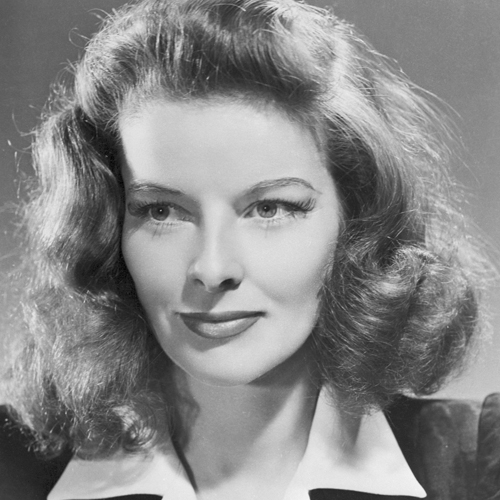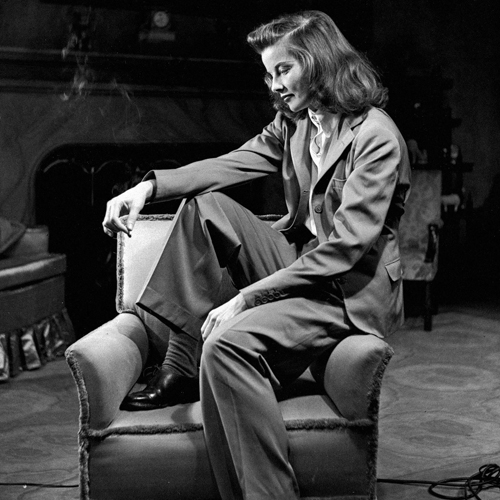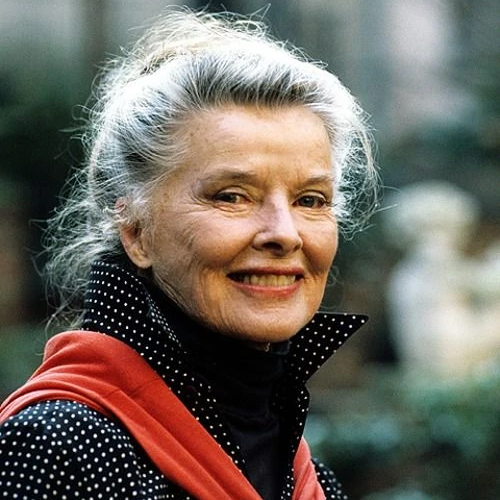
Katharine Hepburn
Born: 12 May 1907
Died: 29 June 2003 (96 Years)
Cause: In May 2003, an aggressive tumor was found in Hepburn's neck. The decision was made not to medically intervene, and she died from cardiac arrest on June 29, 2003, a month after her 96th birthday at the Hepburn family home in Fenwick, Connecticut.
Died: 29 June 2003 (96 Years)
Cause: In May 2003, an aggressive tumor was found in Hepburn's neck. The decision was made not to medically intervene, and she died from cardiac arrest on June 29, 2003, a month after her 96th birthday at the Hepburn family home in Fenwick, Connecticut.

Katharine Hepburn

Katharine Hepburn
Katharine Houghton Hepburn (May 12, 1907 – June 29, 2003) was an American actress of film, stage and television. Hepburn's career as a Hollywood leading lady spanned over 60 years. She was known for her headstrong independence, spirited personality and outspokenness, cultivating a screen persona that matched this public image, and regularly playing strong-willed, sophisticated women. Her work was in a range of genres, from screwball comedy to literary drama, and earned her various accolades, including four Academy Awards for Best Actress—a record for any performer. In 1999, Hepburn was named the greatest female star of classic Hollywood cinema by the American Film Institute.
Raised in Connecticut by wealthy, progressive parents, Hepburn began to act while at Bryn Mawr College. Favorable reviews of her work on Broadway brought her to the attention of Hollywood. Her early years in film brought her international fame, including an Academy Award for Best Actress for her third film, Morning Glory (1933), but this was followed by a series of commercial failures culminating in the critically lauded box office failure Bringing Up Baby (1938). Hepburn masterminded her own comeback, buying out her contract with RKO Radio Pictures and acquiring the film rights to The Philadelphia Story, which she sold on the condition that she be the star. That comedy film was a box office success and landed her a third Academy Award nomination. In the 1940s, she was contracted to Metro-Goldwyn-Mayer, where her career focused on an alliance with Spencer Tracy. The screen-partnership spanned 26 years, and produced nine films.
Hepburn challenged herself in the latter half of her life, as she tackled Shakespearean stage productions and a range of literary roles. She found a niche playing middle-aged spinsters, such as in The African Queen (1951), a persona the public embraced. Hepburn received three more Academy Awards for her performances in Guess Who's Coming to Dinner (1967), The Lion in Winter (1968), and On Golden Pond (1981). In the 1970s, she began appearing in television films, which later became her focus. She made her final screen appearance at the age of 87. After a period of inactivity and ill health, Hepburn died in 2003 at the age of 96.
Hepburn shunned the Hollywood publicity machine and refused to conform to society's expectations of women, famously wearing trousers before they were fashionable for women. She was briefly married as a young woman but thereafter lived independently. With her unconventional lifestyle and the independent characters she brought to the screen, Hepburn epitomized the "modern woman" in the 20th-century United States, and is remembered as an important cultural figure.
Hepburn stated in her eighties, "I have no fear of death. Must be wonderful, like a long sleep." Her health began to deteriorate not long after her final screen appearance, and she was hospitalized in March 1993 for exhaustion. In the winter of 1996, she was hospitalized with pneumonia. By 1997, she had become very weak and was speaking and eating very little, and it was feared she would die. She showed signs of dementia in her final years. In May 2003, an aggressive tumor was found in Hepburn's neck. The decision was made not to medically intervene, and she died from cardiac arrest on June 29, 2003, a month after her 96th birthday at the Hepburn family home in Fenwick, Connecticut. She was buried in Cedar Hill Cemetery in Hartford. Hepburn requested that there be no memorial service.
Hepburn's death received considerable public attention. Many tributes were held on television, and newspapers and magazines dedicated issues to the actress. American president George W. Bush said Hepburn "will be remembered as one of the nation's artistic treasures". In honor of her extensive theatre work, the lights of Broadway were dimmed for the evening of July 1, 2003. In 2004, in accordance with Hepburn's wishes, her belongings were put up for auction with Sotheby's in New York City. The event garnered $5.8 million, which Hepburn willed to her family.
(wikipedia)
Raised in Connecticut by wealthy, progressive parents, Hepburn began to act while at Bryn Mawr College. Favorable reviews of her work on Broadway brought her to the attention of Hollywood. Her early years in film brought her international fame, including an Academy Award for Best Actress for her third film, Morning Glory (1933), but this was followed by a series of commercial failures culminating in the critically lauded box office failure Bringing Up Baby (1938). Hepburn masterminded her own comeback, buying out her contract with RKO Radio Pictures and acquiring the film rights to The Philadelphia Story, which she sold on the condition that she be the star. That comedy film was a box office success and landed her a third Academy Award nomination. In the 1940s, she was contracted to Metro-Goldwyn-Mayer, where her career focused on an alliance with Spencer Tracy. The screen-partnership spanned 26 years, and produced nine films.
Hepburn challenged herself in the latter half of her life, as she tackled Shakespearean stage productions and a range of literary roles. She found a niche playing middle-aged spinsters, such as in The African Queen (1951), a persona the public embraced. Hepburn received three more Academy Awards for her performances in Guess Who's Coming to Dinner (1967), The Lion in Winter (1968), and On Golden Pond (1981). In the 1970s, she began appearing in television films, which later became her focus. She made her final screen appearance at the age of 87. After a period of inactivity and ill health, Hepburn died in 2003 at the age of 96.
Hepburn shunned the Hollywood publicity machine and refused to conform to society's expectations of women, famously wearing trousers before they were fashionable for women. She was briefly married as a young woman but thereafter lived independently. With her unconventional lifestyle and the independent characters she brought to the screen, Hepburn epitomized the "modern woman" in the 20th-century United States, and is remembered as an important cultural figure.
Hepburn stated in her eighties, "I have no fear of death. Must be wonderful, like a long sleep." Her health began to deteriorate not long after her final screen appearance, and she was hospitalized in March 1993 for exhaustion. In the winter of 1996, she was hospitalized with pneumonia. By 1997, she had become very weak and was speaking and eating very little, and it was feared she would die. She showed signs of dementia in her final years. In May 2003, an aggressive tumor was found in Hepburn's neck. The decision was made not to medically intervene, and she died from cardiac arrest on June 29, 2003, a month after her 96th birthday at the Hepburn family home in Fenwick, Connecticut. She was buried in Cedar Hill Cemetery in Hartford. Hepburn requested that there be no memorial service.
Hepburn's death received considerable public attention. Many tributes were held on television, and newspapers and magazines dedicated issues to the actress. American president George W. Bush said Hepburn "will be remembered as one of the nation's artistic treasures". In honor of her extensive theatre work, the lights of Broadway were dimmed for the evening of July 1, 2003. In 2004, in accordance with Hepburn's wishes, her belongings were put up for auction with Sotheby's in New York City. The event garnered $5.8 million, which Hepburn willed to her family.
(wikipedia)

